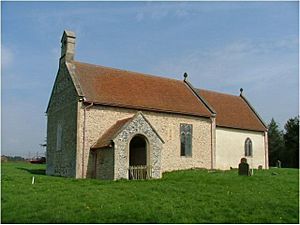Langford, Norfolk facts for kids
Quick facts for kids Langford |
|
|---|---|
 Saint Andrew, Langford, Norfolk |
|
| OS grid reference | TL8396 |
| • London | 91.9 miles (147.9 km) |
| Civil parish |
|
| District | |
| Shire county | |
| Region | |
| Country | England |
| Sovereign state | United Kingdom |
| Post town | THETFORD |
| Postcode district | IP24 |
| Police | Norfolk |
| Fire | Norfolk |
| Ambulance | East of England |
| EU Parliament | East of England |
| Top - 0-9 A B C D E F G H I J K L M N O P Q R S T U V W X Y Z |
Langford is a small village in Norfolk, England. It used to be its own civil parish, but now it's part of the Ickburgh parish. Langford is located in the Breckland area.
The village is special because it's inside a training area for the British military. This means you can't usually visit without special permission. Langford is about nine miles south of the town of Swaffham. In 1931, only 34 people lived there.
History of Langford
The name 'Langford' means 'Long ford'. A ford is a shallow place in a river or stream where you can cross.
Langford is mentioned in the Domesday Book from 1086. This was a huge survey of England ordered by William the Conqueror. In the book, Langford is called Langaforde. It says that Hugh de Montfort owned most of the land. The survey also noted that the village had two mills, a place for fishing, and two beehives.
On April 1, 1935, Langford stopped being its own parish and joined with Ickburgh.
Village Evacuation During World War II
During the Second World War, the village of Langford was taken over by the British Army. It became part of the Stanford Battle Area. This area was needed to train Allied soldiers. They were getting ready for a very important event called Operation Overlord. This was the big battle in Normandy, France, in 1944.
Some villagers were happy to help the war effort by leaving their homes. But many others were not pleased. There were many heated meetings in the village, and some people refused to leave. A book called Farming, on a Battle Ground was written about this time. The author, Lucille Reeve, was one of those who didn't want to leave.
After the war ended, the villagers were not allowed to return home. The government had promised they could come back. However, the War Office later bought the land. They even threatened to force the landowners to sell. Most people in Langford didn't own their homes or farms; they rented them. So, they received very little money as payment. Many lost their jobs and had to move into council housing.
The villagers kept fighting for many years to go back to their homes. But the start of the Cold War meant the military still needed the training area. This took away all their chances of returning.
Since the evacuation, Langford and its surrounding area have remained part of the Ministry of Defence's training grounds. You still need special permission to go there.
The Parish Church of St Andrew
The church in Langford is called St Andrew's. It's a simple church with two main parts. These parts were built a very long time ago, during the Norman period.
The church used to have a medieval tower, but it was lost in the 1700s. The bell tower you see now was added much later, in the Victorian era. It was built to look like the old Norman style.
If you look closely at the edges of the church roof on the east side, you can see some interesting carved faces. There's a grinning cat on one side and a 'wild man' on the other.
 | Kyle Baker |
 | Joseph Yoakum |
 | Laura Wheeler Waring |
 | Henry Ossawa Tanner |


